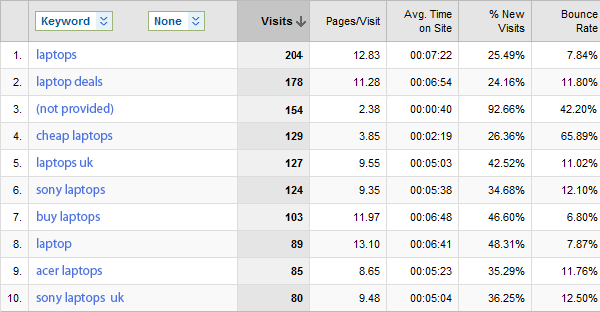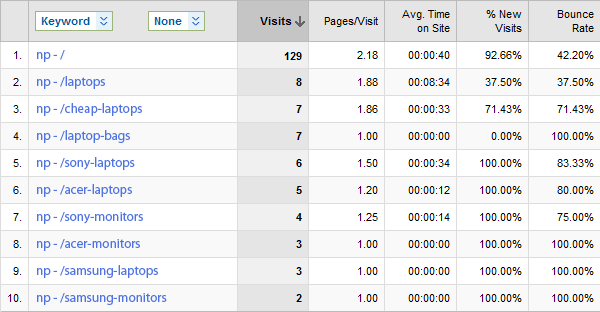How to Protect SEO Performance During a Site Migration
Arming yourself with the right tools to ensure a smooth site migration is important - find out how to protect your SEO during a migration today.
Read moreA year ago I flagged up in a post for ClickThrough how Google had changed their method of reporting search referrals into analytics systems.
In their announcement Google explained it this way:
"When a signed in user visits your site from an organic Google search, all web analytics services, including Google Analytics, will continue to recognize the visit as Google “organic” search, but will no longer report the query terms that the user searched on to reach your site.
Keep in mind that the change will affect only a minority of your traffic. You will continue to see aggregate query data with no change, including visits from users who aren’t signed in and visits from Google 'cpc'."
“Not provided” refers to when the individual search keywords can’t be viewed in any analytics system since they are not passed through in the referrer information to a site by Google. These visits are still registered as natural search visits we lose all the details about which keywords. Although Google only masks these keywords when users are using a secure Google site such as Gmail or Google+ as logged-in users, but that’s increasing.
Google said at the time of the introduction that it will only affect a “minority of traffic”, but if you look at your analytics data, you will typically see not provided well into double digits. In fact, it’s probably much higher, for example Optify reported that for their B2B clients, not provided had increased to over 40 percent.
Once the figure is at this level we need to think about finding other ways to check and benchmark our SEO keywords are effective. A year ago Avinash Kaushik, the digital marketing evangelist at Google wrote this post detailing ways to do this. More recently Ecommerce consultant Dan Barker has explained how you can get more insight by using a great piece of lateral thinking. This considers the page where the not provided search is entering the site through a landing page and then reports on this.
Analytics keywords report - Before

Analytics keywords report - After

The new report is created by creating a new custom filter to rewrite the "not provided" data when it is first collected by Google Analytics. NB. This should be tested on a duplicate test profile before applying to the master profile.
Read Dan’s post on the Econsultancy blog for more detail on how to set up the filter.
I hope this post is useful in flagging up the problem if you manage search and were unaware of the current scale of this issue or if you were aware, but didn’t know how to get this insight!
More articles you might be interested in:

Arming yourself with the right tools to ensure a smooth site migration is important - find out how to protect your SEO during a migration today.
Read more
Google employees have recently announced that the upcoming Google Core Update is set to be released in the coming weeks. Understanding and addressing...
Read more
Language matters. Any marketer worth their salt knows this. But when discussing gender and sexual orientation, that importance is amplified tenfold.
Read more
Advertising via Google is constantly evolving, and new ways to showcase your brand and business offering are regularly being rolled out. The latest...
Read more
When marketers think of thought leadership, there are names rather than ideas, that tend to spring to mind.
Read more
The UK market has been waiting with bated breath for Google’s Vehicle Ads release – so where is the update? Learn more.
Read more
As Google turns 25, we’re taking a look back at our favourite Google moments. Which features have made the biggest impact on digital marketing on...
Read more
With the release of GPT-4, how revolutionary will this tool be? Alan Rowe takes us through it...
Read more